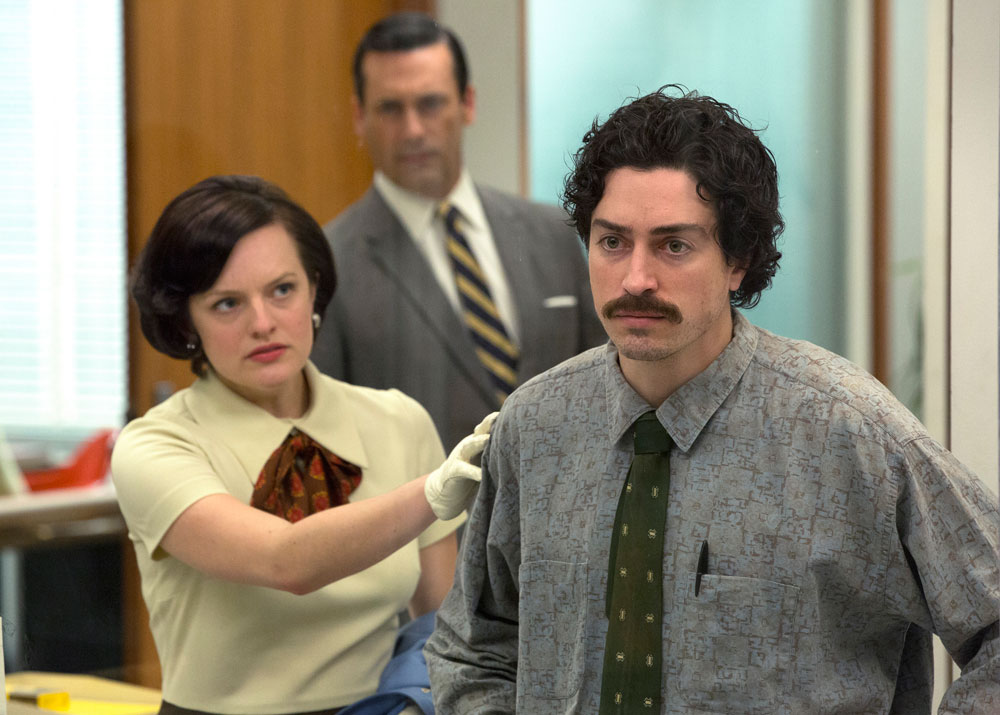 Elisabeth Moss, Jon Hamm, and Ben Feldman in AMC’s “Mad Men”
Elisabeth Moss, Jon Hamm, and Ben Feldman in AMC’s “Mad Men”
Last week we kind of dismissively referred to Mad Men‘s love of dream-like atmospheres that often work to tell the story but just as often work to bring the viewer out of it, depending on how well it’s rendered. This episode was weirdly off from beginning to end, but “dream-like” seems too benign a term to use to describe it. From Sally getting into swordfights to Betty sounding like a junior Phyllis Schlafly to Megan suddenly dipping her toes in the ladypond to Ginsberg pulling a Van Gogh on Peggy, characters weren’t so much turning on a dime as they were turning into the people they were inevitably going to become. In fact, we tend to think that’s pretty much the entire point of this season: people becoming the people they can’t help becoming. Peggy is career-driven, but epically bad at interpersonal stuff; Joan still enjoys being a Queen Bee in the office; Roger is under a pile of naked bodies and liquor bottles, struggling to find his way out from under it. Despite all the changes in their lives and throughout the decade, they are all, essentially, the same people. This week, we find out that Megan, Ginsberg and Betty are … pretty much what we all knew they were.
Megan is perhaps the biggest “surprise” (if you can call it that): the scheming, jealous wife. Unlike a lot of the viewers, we’ve always liked Megan, although her character flaws were more than evident over the years: a sort of petulance that’s different from Betty’s brand of petulance only by a matter of degrees. Betty is a petulant child and Megan’s more like a petulant teenager, using drugs, sex, and money this episode to try to get her way or get the response she wants. At a different point in their marriage, she never would’ve been that threatened by the existence of Stephanie, but this girl came into her life and shone a harsh light on Megan’s pretensions and insecurities right at a time when she didn’t want to hear it. Pregnant and living the counterculture life, she is both what Don wishes Megan was (pregnant) and what Megan wishes Megan was (more adventurous than she actually is). So Megan wields a checkbook like a weapon, even though the fact that she can write out a check for a thousand dollars so casually is representative of just how far she is from the struggling actress role she likes to pretend she inhabits. The irony seems to have been lost on her. And when her bizarre little attention-seeking dance failed to get Don angry at her (as it was designed to do), she wound up throwing a three-way at him out of left field. We’re not entirely sure what her intent with that was, other than trying to give Don what she thinks he might want. But even then, it came off like an odd move. Is Megan so desperate to keep Don that she’ll resort to this kind of maneuvering in her life? Or is she merely trying to punish him by driving away Stephanie and taking a more assertive role in bed? Either way, that marriage is worse off than it’s ever been. Worse than we imagined it might get, actually. We figured Don would cheat, Megan would find out, and that would be the end of it. But Megan’s becoming more insecure over time (something that seems inevitable if you’re Don Draper’s wife) and it seems like she’s casting about desperately in panic.
Meanwhile, the second Mrs. Draper (because all three Mrs. Drapers, alive and dead, loomed large in this story) continues her Feminine Mystique-inspired journey from pretty, long-suffering wife to angry and loudly opinionated woman. Like all of Betty’s journeys big and small, it’s not necessarily a pretty one. On the one hand, you want to cheer her standing up to Henry’s (it has to be said: out of left field) chauvinism and screaming that maybe she’ll run for office just so she can say what she thinks. On the other hand, she thinks young people having sex are why we haven’t won Vietnam yet and that Sally’s greatest worth as a young woman resides in her perfect nose (“THAT’S YOUR FACE, YOUNG LADY!”). Once again, the show is exploring the rise of the new conservativism in the wake of the ’68 Democratic convention. And we have to say, we’re loving the slightly devious take on feminism here: that it gave voice to plenty of women who would later stand up to denounce feminism. Of course this is who Betty would become. Even if her politics revolt us, we’re looking forward to seeing what she does next.
And sadly, Ginsberg turned out to be exactly what the show had been hinting he was for years now. Rather than repeat ourselves, here’s what we said last season after he was seen rocking on the floor and talking about the voices in his head:
“Michael’s having a serious mental health crisis and because he’s surrounded by a bunch of lunatics already, no one can see the signs, except maybe Stan, who doesn’t seem to know what to do about it. It’s not just the inappropriate outbursts, or the silent rocking on the floor, but the admissions of auditory hallucinations; once last season when he told Peggy that he received a message from Mars telling him “Stay where you are,” and then again this episode when he said, “I can’t turn off the transmissions to do harm; they’re beaming them right into my head.” This isn’t colorful language or joking. People were far less well-informed about mental illness back then than they are now. See this for an idea of how it was viewed in the popular imagination at the time; it was Napolean hats, pink elephants and little green men, according to the conventional wisdom. People did not know enough about it to be able to make jokes about “receiving transmissions into my head.” That’s too specific and knowledgeable a choice of words for him to be merely colorfully talking about how stressed out he is over Dow Chemical. For such wording to be used twice in the very few scenes we’ve seen of him is highly notable. Again, you only have so many minutes of screen time to define a character in an ensemble drama. All choices are highly deliberate ones. Taking these quotes, looking at his general affect, lack of social ability, and a parent who seems to hover and fuss over him, we think it’s clear that Ginsberg is suffering from serious mental illness.”
Whatever the diagnosis – and we’re not likely to get an exact answer on that – his deteriorating mental state has been obvious to everyone but his co-workers (except for Stan) for a good while. The nipple moment was shocking, but like everything else this episode, sadly inevitable. They’re all becoming the people they can’t help becoming.
Or are they? Because Don seems to be the one person in the story right now who is struggling to become more than what he is; better than what he was. This episode was the first time we wondered if the show wasn’t actually heading toward a somewhat happy ending for Don (instead of long dive off the roof many people seem to think is going to happen). Not that he won the day or anything. He’s still in a terrible position, both professionally and in his personal life. But maybe that three-way helped him get some of his mojo back (Weiner does tend to like that kind of reductive writing when it comes to Don, where a hot sex scene re-energizes him James Bond-style), because he swaggered into that Phillip Morris meeting and (you’ll pardon us) slapped his dick whitman all over Jim and Lou’s astonished faces. Then he shoved them in a cab and literally whistled his way back to work. He deliberately broke the rules right in front of the man who wrote them (Don’t go off-script in front of clients and don’t meet with clients without permission) and wants to see him fail. Result? Nothing. The rules are bullshit. Jim Cutler is bullshit. Don Draper’s big dick and intimidating talent are all that matters.
But is it? Is Don “back?” Doesn’t it seem silly asking that question now? Hasn’t it been asked every season for the last three or four? And hasn’t it been untrue in every case? It sure felt like he was back. Jim and Lou were open-mouthed and incredulous at his boldness and swagger. And in typical Don fashion, he took someone else’s idea, put a spin on it, and used it for his own ends. After all, his “pitch” to Phillip Morris was pretty much exactly the argument Roger used to prevent the partners from firing him: Do you really want to see Don Draper working for your competition? It remains to be seen whether Don is truly “back” (or even if there’s a “back” to return to), but until he is, he’s quite happy to use past glories and his own reputation to stave off the looming ruin that’s been around the corner of his life for a long time now. Can people change? Can Don? All indications in the story say “No,” but if that was truly the case, we’d be writing about the series finale this morning.
In the end, maybe all the people in this story spinning their wheels and failing to escape who they are should heed Michael Ginsberg’s ominous advice:
“GET OUT WHILE YOU CAN!”
Much more to come in our Mad Style on Wednesday.
[Photo Credit: Michael Yarish/AMC]
Orphan Black: Governed As It Were By Chance Next Post:
Fan Bingbing in Georges Chakra Couture at the “X-Men: Days Of Future Past” New York Premiere
Please review our Community Guidelines before posting a comment. Thank you!



